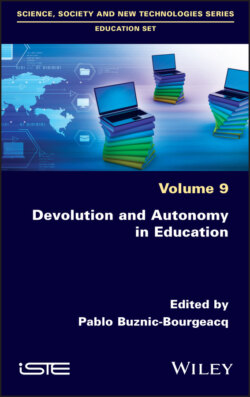Читать книгу Devolution and Autonomy in Education - Группа авторов - Страница 11
The teacher’s role in the devolution process
ОглавлениеThe school institution defines the framework of the teacher’s action, according to modalities that differ from country to country. In France, these modalities are largely defined by official instructions, particularly school curricula, whereas textbooks are published freely by private publishers (Bruillard 2005). The official instructions give the teacher a list of knowledge to teach, sometimes accompanied by complements (curriculum guides) suggesting ways of teaching. In all cases, from such a list and even with some additional suggestions, the teacher is led to choose what, in daily situations, will be proposed to the student.
The teacher starts from the knowledge and must somehow allow the student to acquire situational knowledge that is appropriate to them (institutional knowledge → situational knowledge). The choices he or she makes, even before the meeting with the students, are part of the devolution process that affects both the teacher and the students. Contrary to the popularized form that the term “devolution” sometimes takes on, it is not a kind of tool at the teacher’s full disposal: the teacher too is subject to the vagaries of the choices imposed on him or her by the characteristics of the situations that he or she sets up in a more or less deliberate manner. In particular, even if we can broadly consider the teacher to be rather free in his (oral) speech, most of the time he or she cannot easily change in the course of the action neither the writings he or she has prepared beforehand (e.g. photocopies) nor the material he or she has prepared to put the students in situations, and even less his or her own didactic situational knowledge related to the knowledge to be taught. His leeway is thus very limited.
In the teacher’s action, what is usually called the “instruction” (the initial guidelines of the task pupils have to achieve) is only one of the tools that influence the process of devolution in a learning situation, a somewhat excessive power to act is granted to those instructions, as if the teacher could entirely constrain the action of the students. However, any human action, even if it results from a prescription, is always the object of an interpretation that transforms the prescription, an interpretation that, even if it actually causes the reality to deviate from the prescribed, is the mark of the subject’s investment in the situation (Clot 1999). Moreover, in the school context, especially in elementary school, the implementation of teaching situations involves objects, and, in particular, material objects, objects of the world that “evoke the uses and affects that [the pupil] already knows” (Laparra and Margolinas 2016, p. 176). The teacher’s efforts to create a situation in which the student encounters situational knowledge that is appropriate to institutional knowledge can be nullified by the students’ previous uses (academic or otherwise) of objects that the teacher has, sometimes by chance, used (e.g. see, in particular, Chapters 1 and 2).
